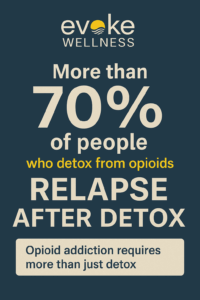The opioid crisis has evolved—and not for the better. Today, synthetic opioids like fentanyl are driving a deadly surge in overdoses. For individuals struggling to stay sober or those who’ve tried outpatient treatment without lasting success, the path forward can feel uncertain. But residential treatment for opioid addiction continues to offer something essential: safety, structure, and a real chance at healing.
The High-Stakes Reality of Today’s Opioid Crisis
Overdose deaths involving synthetic opioids—primarily fentanyl—have skyrocketed in recent years. This highly potent drug is often mixed with heroin or pressed into counterfeit pills, making relapse not just risky, but potentially fatal. Even a small amount can trigger an overdose.
For many, it’s not just the drug—it’s the cycle. Trying to manage opioid addiction in outpatient settings or at home can lead to repeated relapses. It’s not a lack of willpower. It’s the overwhelming nature of physical dependence, emotional distress, and environmental triggers all at once.
Fentanyl has changed the equation. It’s stronger, deadlier, and often used unknowingly. This means that even one misstep during a relapse can cost a life.
Why Outpatient Isn’t Always Enough
Outpatient programs can be incredibly helpful for many people. They allow you to maintain work, school, or family responsibilities while receiving treatment. But they also rely on your environment being relatively stable—and that’s not always the case.
If your living situation includes people who still use, or if stress and triggers are constant, outpatient care may leave you exposed. Even when you know what to do, being in the same environment where you used can overwhelm your ability to apply what you’ve learned.
You might have found yourself nodding along in therapy one day, only to be back using the next. That doesn’t mean you failed. It might just mean you needed a different level of care—one that surrounds you with safety and support 24/7.
How Residential Treatment Changes the Equation
Residential treatment program offers something outpatient care can’t: full immersion. It removes you from the daily stressors, triggers, and access to substances that make early recovery so fragile.
In a residential setting, you’re given the time and space to stabilize physically, emotionally, and mentally. You’re surrounded by professionals who understand the complexity of opioid addiction—and by peers who are walking the same path. The schedule is structured, the care is continuous, and the focus is deep healing.
What to Expect in Residential Treatment for Opioid Addiction
At Evoke Wellness, our residential program is rooted in compassion and evidence-based care. Here’s what you can expect:
- Medical supervision during detox and stabilization
- Therapeutic support including individual and group therapy
- Medication-assisted treatment (MAT) when clinically appropriate
- Structured daily schedules to support routine and recovery
- Nutritional support and wellness activities
- Peer community that reinforces shared growth and accountability
This level of care is designed to do more than just stop the substance use. It helps you build a foundation for a different way of living—one that supports long-term recovery.
Who Benefits Most from Residential Treatment?
Residential treatment isn’t just for people at “rock bottom.” It’s for anyone who needs:
- A break from environments that reinforce use
- A chance to reset without daily pressures
- Medical support for withdrawal and co-occurring mental health symptoms
- Greater structure to break the cycle of relapse
It’s especially effective for those who:
- Have tried outpatient care without sustained success
- Are using fentanyl or heroin
- Experience frequent cravings or triggers at home
- Have mental health conditions like anxiety, depression, or trauma
Choosing residential doesn’t mean you failed outpatient. It means you’re choosing the level of care that matches the intensity of your needs.
Why This Level of Care Matters in Massachusetts
At Evoke Wellness in Massachusetts, our residential program is designed with both safety and transformation in mind. We understand that opioid addiction is complex and often tied to trauma, mental health, and loss. That’s why we offer an integrated, medically supervised program that goes far beyond detox.
We work with you to understand your story, tailor your care plan, and support your journey from detox to stability to long-term healing. We also coordinate with outpatient and aftercare options to ensure continuity once you’re ready to step down.
FAQs About Residential Treatment for Opioid Addiction
How long does residential treatment typically last?
Most residential treatment programs range from 30 to 90 days, depending on individual needs and progress. Some people benefit from longer stays, especially when dealing with co-occurring disorders or a history of relapse.
Will I be able to talk to my family?
Yes. Family involvement is encouraged. Most programs offer scheduled family therapy sessions and communication options that support your recovery while maintaining healthy boundaries.
Is residential treatment covered by insurance?
Many insurance plans do cover residential treatment, but coverage varies. Our admissions team can verify your benefits and walk you through what to expect.
What happens after residential treatment?
After residential treatment, many clients transition to a step-down level of care, like partial hospitalization (PHP) or intensive outpatient (IOP). We work with you to plan next steps that match your needs.
What if I’ve already tried treatment before?
You’re not alone. Many people try more than once before finding lasting recovery. A different setting, approach, or level of care can make all the difference.
Ready to Take the First Step? Call us at (866) 931-6429. Our team will meet you where you are—no judgment, no pressure, just honest support and a place to begin again.





